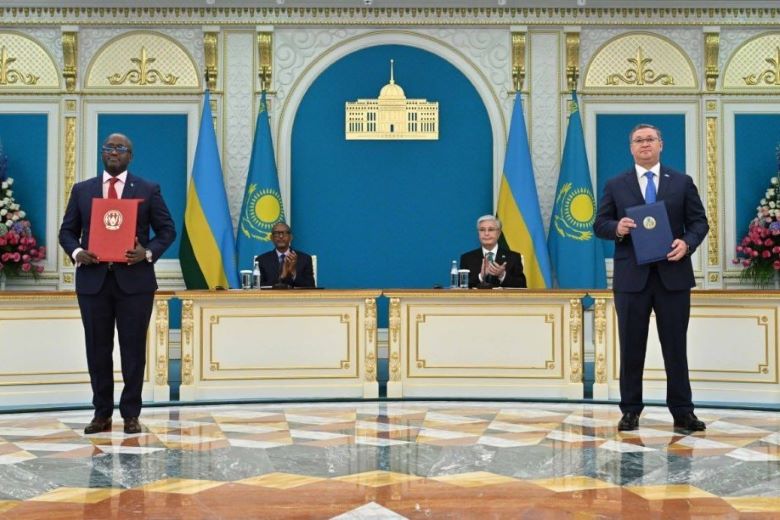Rwanda and Kazakhstan are entering a new chapter of bilateral relations, marked by a series of strategic agreements and a shared vision for deeper collaboration across key sectors.
Speaking at the 2025 Astana International Forum, Rwanda’s Minister of Foreign Affairs and International Cooperation, Olivier Nduhungirehe, affirmed that the partnership between the two nations is poised for transformative growth.
In his address, Minister Nduhungirehe emphasized the need to strengthen Africa–Central Asia cooperation, citing Kazakhstan’s advantageous geopolitical position and expanding infrastructure as vital entry points for connecting African markets to Asia.
He referenced Kazakhstan’s major trade links with global powers such as the European Union, China, and Russia, while noting that trade with Africa, currently at $1 billion, is gradually increasing and holds enormous untapped potential.
Highlighting Kazakhstan’s investment in regional transport corridors like the Trans-Caspian and Trans-Afghanistan routes, Nduhungirehe expressed optimism that such infrastructure could create new commercial pathways linking Central Asia to Africa through the Indian Ocean.
This, he said, could boost bilateral trade in sectors including agriculture, mining, digital technology, and manufacturing.
This optimism was reinforced by a high-level visit from President Paul Kagame to Kazakhstan, during which both countries signed several cooperation agreements.
The accords, signed at the Aqorda Presidential Palace and witnessed by President Kagame and his Kazakh Counterpart President Kassym-Jomart Tokayev, cover a wide range of fields such as information and communication technology, finance, education, mining, agriculture, and diplomatic coordination.
President Kagame commended Kazakhstan’s national development and growing global influence, calling it a reflection of President Tokayev’s leadership and the determination of the Kazakh people.
In response, Tokayev praised Rwanda’s consistent economic growth, standing at 8%, and its institutional strength, citing the country as a model of post-conflict resilience and reform.
The two leaders agreed to prioritize initiatives that enhance trade and investment, encourage digital transformation, and promote sustainable agriculture.
They also underscored the importance of private sector engagement and technological cooperation as pillars of their future relationship.
Held under the theme “Connecting Minds, Shaping the Future,” the Astana International Forum brought together over 5,000 global delegates to tackle issues such as climate change, energy security, and economic instability.
Against this backdrop, the Rwanda–Kazakhstan partnership signals a promising direction in South–South cooperation, reinforcing the role of emerging economies in shaping global development.

